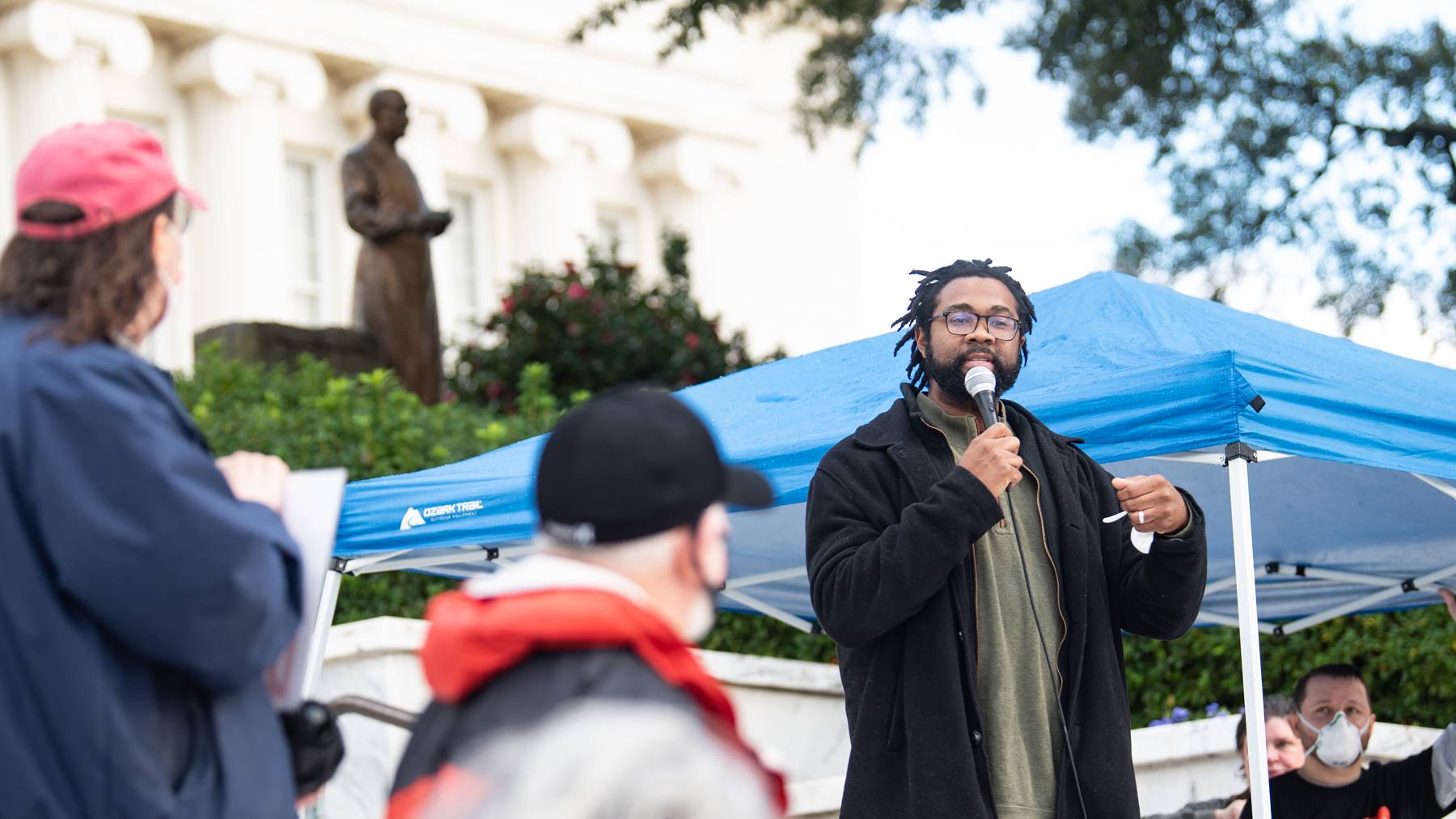As President Joe Biden and others in Washington, D.C., condemned those who encouraged and participated in the Jan. 6 insurrection, pro-democracy advocates across the country staged more than 350 vigils to promote voting rights and remember those who died and were injured during the assault on the U.S. Capitol.
In Montgomery, Alabama, a small but energized crowd gathered at the state Capitol, where Martin Luther King Jr. delivered his “How Long, Not Long” speech at the culmination of the Selma-to-Montgomery voting rights march on March 25, 1965.
Demonstrators held signs reading “Fight poverty, not the poor” and “Votes not violence,” even as rain threatened to cancel the event.
As the crowd began to form, the song “We Shall Not Be Moved” by Mavis Staples, a staple of the civil rights movement, began playing, lifting up the crowd as the rain ceased and a rainbow appeared overhead.
“Coming together, we can prevent another Jan. 6 attack and realize the promise of democracy for all of us, no matter our color, ZIP code or income, so that we all have an equal say in the decisions that shape our daily lives and futures,” said Kathleen Kirkpatrick, an organizer of the vigil hosted by the Hometown Organizing Project.
Holding umbrellas, the demonstrators chanted, “This is what democracy looks like!”
They cheered loudly, encouraging the U.S. Senate from afar to pass urgent legislation to protect the right to vote.
“Forward together, not one step back!” the crowd recited as one by one, speakers came to the microphone. Attendees listened as presenters discussed the state of voting rights.
“Until we defend democracy with voting rights, the insurrection will start to grow and become bolder,” said Mike Kane, a resident of Richmond, Virginia, who was in Montgomery visiting famous civil rights sites and attended the rally. “I think what happened last year was a tragic practice session. For some of these militias, I believe they will be back and try harder to end democracy.”
Karen Jones of the Save OurSelves Movement for Justice & Democracy said she was there to remember the violation of the U.S. Capitol one year earlier.
“I thought that the insurrection was the most dangerous thing that America has seen, at least in my lifetime,” Jones said. “I felt like those individuals were traitors; we weren’t attacked by a foreign entity, we were attacked by people who call themselves ‘patriots.’ That wasn’t patriotism; it showed how weak we are.”
Rally attendee Clark Bruner said, “Voting rights are important because that’s the way to a true democracy. I want to let the leadership in Alabama know that there are people out here who still believe in democracy, and this whole anti-election, anti-vote mess that the former president is bringing up is ridiculous. It’s ridiculous, false, violent and harmful to us and our democracy.
“It’s been a struggle for Black people in Alabama to vote. Our state wants to keep people down – they want to keep everybody down. Black and white, if you’re poor, you don’t count. And I say we do count.”
The event concluded with a prayer by the Rev. Carolyn Foster of Greater Birmingham Ministries, punctuated by “amens” from the crowd.
“We call on you, God, to help us stand up against these injustices,” Foster said. “We ask you to support our work of resisting the spirits of pride, division, confusion, hatred and deception that have been taken to keep America’s citizens from voting.”
‘The Big Lie’
On the National Mall in Washington, D.C., more than 100 people started assembling at 4 p.m. in front of a large sign reading “Voters Decide” and “Protect Democracy.”
The mood was somber, and the air was chilly.
“The big problem is the Big Lie,” said People for the American Way President Ben Jealous, referencing the false narrative that Donald Trump lost the election only because of massive voter fraud.
U.S. Rep. Pramila Jayapal of Washington state recounted the events of Jan. 6 from her view inside the Capitol complex: “I remember every moment of it vividly. I remember the pounding on the doors of the insurrectionists. I remember crawling on my knees under banisters … thinking about how if I couldn’t get up and leave … I would attack the knees of whoever came to attack me.”
Speakers and attendees urged Congress to pass voting rights legislation and fully investigate what happened before and on Jan. 6.
“We are looking to our elected officials to continue to investigate the insurrection but also to pass urgently needed voting rights legislation and democracy reform legislation that will protect this country,” said Lisa Gilbert, executive vice president of Public Citizen, a progressive nonprofit and one of the groups that organized the event.
The U.S. Department of Justice has charged more than 725 people in connection with the insurrection, and at least 165 have pleaded guilty, NPR reported. Many have known ties to extremist groups like the antigovernment Oath Keepers and adhered to the pro-Trump QAnon conspiracy theory.
Officials say it is one of the largest and most complex investigations in U.S. history.
Top Photo: Evan Milligan, right, executive director of Alabama Forward, speaks about voting rights to a crowd gathered in front of the Alabama State Capitol in Montgomery, Alabama, on Jan. 6, 2022. (Credit: Hillary Andrews)
More on Jan. 6
To read SPLC’s complete coverage of the January 6 insurrection, visit The Long Path to Insurrection.



